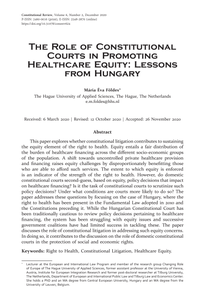This paper explores whether constitutional litigation contributes to sustaining the equity element of the right to health. Equity entails a fair distribution of the burden of healthcare financing across the different socio-economic groups of the population. A shift towards uncontrolled private healthcare provision and financing raises equity challenges by disproportionately benefitting those who are able to afford such services. The extent to which equity is enforced is an indicator of the strength of the right to health. However, do domestic constitutional courts second-guess, based on equity, policy decisions that impact on healthcare financing? Is it the task of constitutional courts to scrutinize such policy decisions? Under what conditions are courts more likely to do so? The paper addresses these questions by focusing on the case of Hungary, where the right to health has been present in the Fundamental Law adopted in 2010 and the Constitutions preceding it. While the Hungarian Constitutional Court has been traditionally cautious to review policy decisions pertaining to healthcare financing, the system has been struggling with equity issues and successive government coalitions have had limited success in tackling these. The paper discusses the role of constitutional litigation in addressing such equity concerns. In doing so, it contributes to the discussion on the role of domestic constitutional courts in the protection of social and economic rights.
MULTIFILE

The main hypothesis underlying this article is that although arbitrators are not formally part of national justice systems, they have dealt with questions of EU fundamental rights and the European rule of law standards for quite some time, at least formally since the landmark CJEU judgment in Eco Swiss in 1999. In fact, in all forms of arbitration, be it national or international, taking place in or across (Member) States daily and not necessarily concerning the application by arbitrators of EU law stricto sensu, arbitrators can be seen as guardians of many crucial procedural guarantees that increase parties’ access to justice and advance the European rule of law, or so we wish to argue. This article is an exploratory piece. That is, it combines the format of the state-of-the-art review with the format of conference proceedings through which we present the main activities of the DG Justice TRIIAL project concerning arbitration. Our main goal is three-fold: (1) to advance the discussion on the relationship between the European rule of law and arbitration, (2) to present the main findings stemming from research and training activities within the TRIIAL training workshops on arbitration, and (3) to formulate future research and practical questions on the topic at hand.
MULTIFILE

This study was commissioned by the European Parliament’s Policy Department for Citizens’ Rights and Constitutional Affairs at the request of the Committee on Constitutional Affairs of the European Parliament. It analyses the political and legal dynamics behind referendums on EU-related matters. It argues that we have entered a period of increasing political uncertainty with regard to the European project and that this new political configuration will both affect and be affected by the politics of EU-related referendums. Such referendums have long been a risky endeavour and this has been accentuated in the wake of the Great Recession with its negative ramifications for public opinion in the European Union. It is clear that referendums on EU matters are here to stay and will continue to be central to the EU’s future as they are deployed to determine the number of Member States within the EU, its geographical reach, its constitutional evolution and adherence to EU policies. Only now they have become an even riskier endeavour.
LINK